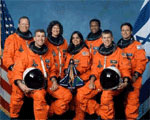Archives
Feb. 28–Mar. 2, 2003
On Friday night, I boarded a chartered bus bound for Greek Peak near Ithaca, N.Y., for my third annual ski trip with some friends from our local Penn State alumni chapter. Enjoyed a pleasant day on the slopes on Saturday, but a steady rain on Sunday kept us indoors. (On the rare occasion that I actually wanted snow, it rained instead. That’s about right.)
We had a good time overall, but if I were you, I’d recommend doing some research before booking a ski trip through a touring company. I’ll admit that it’s convenient and less expensive to sign up for a package deal that covers lodging, transportation, food, and an open bar, but we’ve had to share a crowded bus and hotel with increasingly obnoxious groups each year. This past weekend, I was convinced that a fight was going to break out — not exactly my idea of a fun vacation.
By the way, monorailmike.com is now officially a toddler — Saturday marked the two-year anniversary of the launch of this site. Stay tuned for the “terrible twos.”
[ No. 43 ]
Feb. 25, 2003
I’m usually annoyed when actors or musicians decide to voice their know-it-all, predictable political views in a public forum. But I was genuinely amused to hear that Fred Durst, lead singer of Limp Bizkit (and apparently, a distinguished scholar of international studies), had contributed this gem at the 45th annual Grammy Awards this past weekend:
“I hope we are in agreeance [sic] that this war should go away as soon as possible.”
Source: Ken Tucker, “Don’t Know Why” (Entertainment Weekly, Feb. 24, 2003)
Agreeance? Well, irregardless of his anti-war opinion, Professor Durst should order some Hooked on Phonics tapes to brush up on his, um, vocabulation.
Sometimes, the jokes just write themselves.
[ No. 42 ]
Feb. 17, 2003
The good news is that I was able to stay home from work on Presidents’ Day for the first time in years. The bad news is that I spent most of the afternoon excavating my car from a mountain of snow.
The Philadelphia area received one of the largest snowstorms in its history this past weekend — a total of 18.7 inches of snow fell in just over one day. It was the largest winter storm since the blizzard of 1996, when I was fortunate to catch one of the last buses back to State College before Philly was bombarded with over 30 inches of snow.
Digging out my car after a major snowstorm always makes me wish for a garage to keep my car free from snow, ice, and salt. Then again, when you have a garage, you usually have a driveway as well, which would require a lot more shoveling. So, I guess I’d have to wish for a garage and a snowblower.
I was also amused that no fewer than five of my neighbors in my apartment complex asked to borrow my shovel after I was done. Personally, I own two shovels (one in my apartment and another in my car trunk) and both were in use for hours after I had finished clearing my parking spot. Folks, if you live in the Northeast, do yourselves a favor and buy a shovel — even if you happen to live in an apartment.
Anyway, now I have another story for my grandchildren: “the blizzard of aught-three.”
[ No. 41 ]
Feb. 3, 2003
On Saturday morning, I woke up earlier than usual and drove to my local car dealership for an oil change appointment at 10 a.m.
As I was handing over my keys, the man behind the service counter muttered, “Did you hear the news?”
The last time someone asked me a question like that, it was a Tuesday morning in September 2001 and two planes had inexplicably crashed into Manhattan skyscrapers. Suddenly nervous, I asked, “What news?”
“About the shuttle,” he responded.
“What shuttle?”
“The space shuttle. They lost contact with ’em this morning.”

A few minutes later, I walked into the customer waiting room and found that the TV was already tuned to the national news. The screen proclaimed BREAKING NEWS (which has become a disturbingly frequent fixture on television) and displayed vague images of long streaks of light and smoke.
Before long, it became apparent that the space shuttle Columbia had broken apart during its reentry into Earth’s atmosphere, and that all seven crew members had perished.
The accident immediately reminded me of the Challenger disaster on Jan. 28, 1986. On that day, I was in sixth grade and had been enjoying a snow day at home. Suddenly, I noticed that the TV networks were airing footage of a mid-air explosion, followed by shocking reports that the accident had claimed the lives of all seven astronauts. (We’ve since learned that, prior to the Challenger launch, NASA had carelessly ignored engineers’ repeated warnings about launching in cold temperatures. Whether the loss of the Columbia could have been prevented is unclear, but equally tragic.)
Like many people, I make a genuine effort to stay informed about current events — especially in these troubled times — but I had no idea that the Columbia had even launched in mid-January. At what point did we become so complacent about space missions?
Also, the long-term purpose of space travel seems to be undefined. Decades ago, Americans orbited the Earth, then orbited the moon, and finally landed on the moon, but what’s our next goal?
I recognize that exploration has always been central to the American spirit, and I support the continuation of the space program in some form. But human lives and billions of dollars are on the line, and I’m not aware of any major scientific breakthroughs that have resulted from recent space exploration.
Besides, don’t we have plenty of other problems to solve on Earth?
[ No. 40 ]
